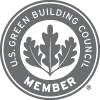Leadership in Energy and Environmental Design (LEED) rating system is an independent green building certification program created by the United States Green Building Council (USGBC), providing voluntary guidelines and third-party verification that a building or community was designed and built using strategies intended to improve performance in environmental and human health metrics such as: sustainable site development, water savings, energy efficiency, materials selection, and indoor environmental quality. Based on the number of points your project achieves in the LEED rating system, a project can obtain one of the following certification levels: Certified, Silver, Gold or Platinum.
USGBC says that LEED defines “a nationally accepted benchmark for the design, construction and operation of high-performance green buildings” and “provides building owners and operators with the tools they need to have an immediate and measurable impact on their buildings’ performance.” LEED certified buildings often provide healthier work and living environments, which contributes to higher productivity and improved employee health and comfort. The USGBC has compiled a long list of benefits of implementing a LEED strategy, which ranges from improving air and water quality to reducing solid waste, benefiting owners, occupiers, and society as a whole.
Urban One can provide LEED Consulting services for projects that they are acting as the Fee Developer / Owner’s Rep on. We typically do not provide this as a stand-alone service for the simple reason that we are not LEED Consultants, but rather Developers who happen to can get their projects LEED certified. Urban One’s LEED Consulting services typically include the following scope of work, that will allow the client and design team to navigate through the LEED building certification process from cradle to grave:
- Discovering and setting LEED goals (score target) with the owner and design team, and establishing design strategies with the design team (path to compliance) for each target LEED prerequisite and point.
- Work with design team in providing suggestions on sustainable systems and materials to potentially incorporate into design that meet the LEED criteria
- Perform a cost analysis evaluating the selected green systems and materials and provide a rough order of magnitude estimate on the added cost impact to use these versus conventional materials.
- Providing close technical support to each design team consultant in getting required elements into the construction documents to achieve the path to compliance.
- Construction Administration (CA), including review of all LEED Submittals from General Contractor during construction. It is imperative that LEED Submittals are reviewed and approved during construction to ensure that all of the proper documentation is received for when the LEED application is put together and submitted. One should not try to pull documentation retroactively after a job is complete. This work will also include responding to any Requests for Information (RFI’s) as needed.
- Register the project for LEED during design and prepare online LEED application throughout duration of project. This includes coordinating any required exhibits from the Architect, MEP Engineers and Owner, preparing exhibits by ourselves, and gathering any additional documentation needed from the General Contractor that was not already received and approved during the LEED Submittal process.
- Once all documentation has been received, Consultant will submit the application to the Green Building Certification Institute (GBCI) for review and ruling.
- If appeals are necessary, Urban One will work on any corrections to ensure the project meets it’s maximum rating potential.
- Urban One will serve as the required LEED Accredited Professional for your project.


